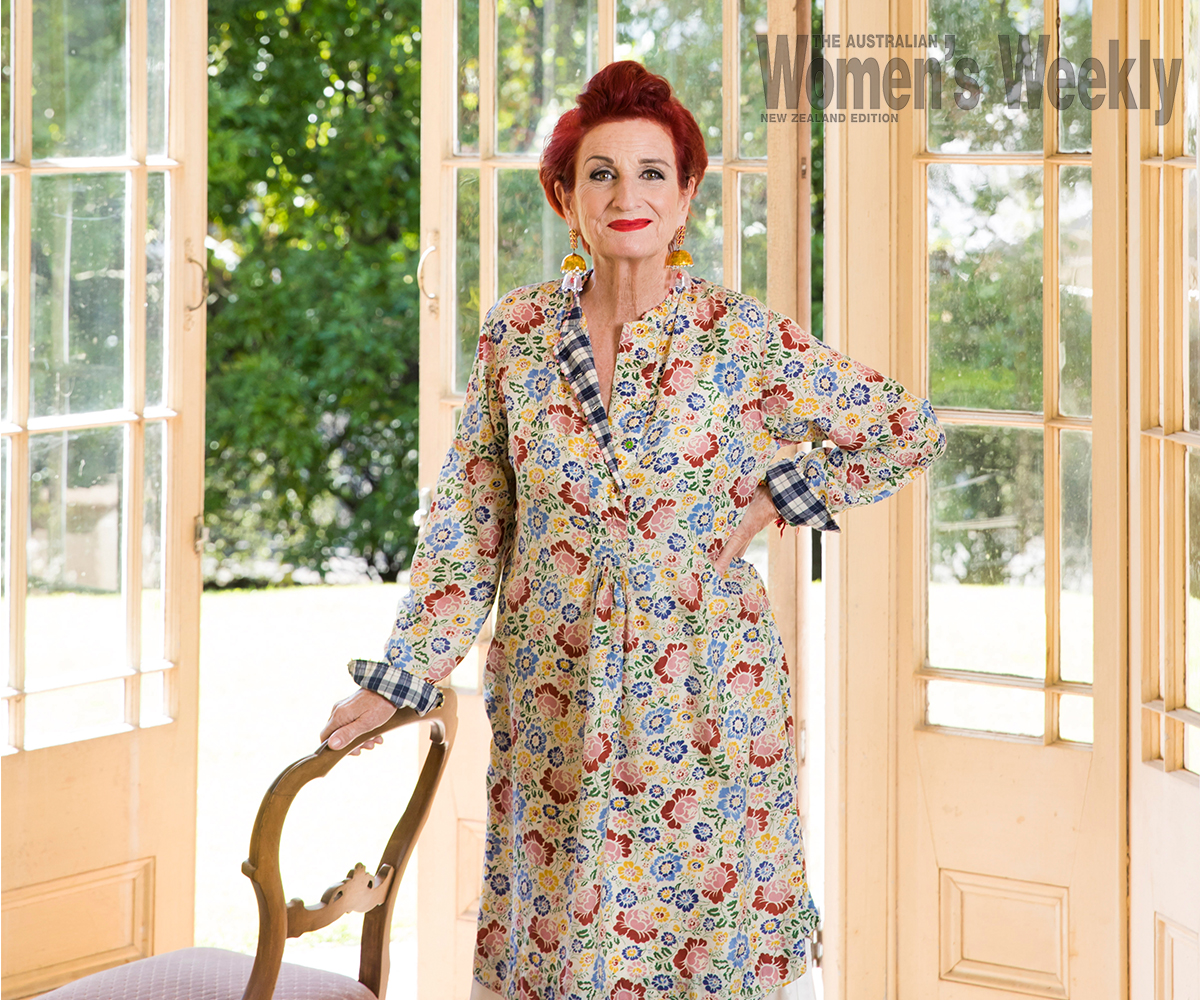If you’re Peta Mathias, and you’re turning 70 while travelling through a variety of beautiful parts of the world, you’re not going to limit yourself to just one birthday cake, are you?
At the tail-end of last year, Peta enjoyed a month-long birthday celebration that took her from her home in Uzès, France, all the way to her home in Auckland – via a 10-day gourmet tour she led through India.
The cake count stands at around 14: there were three macaroon-flavoured cakes presented at a party in Uzès, decorated to perfection and in the shape of a “7”, a “0” and a great big heart.
In Rajasthan, the local tour manager insisted on a cake and celebration – complete with singing – every single night.
And then back home in Westmere, Auckland, there was a two-layer lemon meringue creation by her good friend and fellow chef Julie Le Clerc.
“I’m looking on it as a milestone in my life, I am not looking at it as slowing down or retiring or anything at all like that,” Peta says, sitting in the sunny lounge of her Auckland home.
“I’m making a resolution to myself that this is the year I’m going to make changes.”
To live a creative life, Peta says, is to live a life of reinvention. She has no idea what her next direction is, but change is not something that intimidates her.
“If anything,” she grins, “I’m addicted to it.”

The holy trinity of stability – family, home and career – were never the pot of gold at the end of the rainbow for Peta.
But one aspect that has remained a constant is her dual life between New Zealand and France.
Her love affair with France started in her 20s and never wavered. She has lived there on and off ever since.
For her Australian Women’s Weekly cover shoot, our photographer was lucky enough to visit her during a roasting hot summer.
She started leading cooking classes in France in 2013, always in rented places, meaning an unfamiliar kitchen every time. And so began the idea of creating a permanent home base in Uzès, the sun-soaked medieval village with a population of just over 8500.
Now here she is – happy in her vibrant home.
Yes, Peta has always liked to be surrounded by colour.
“Colour makes you feel alive, it makes you feel happy. I do understand people that like to wear black… I’m just not one of them.”
But she is also meticulous about not allowing her collection of bright collectables to turn into clutter – an uphill challenge, you might imagine, for someone who spends about a quarter of each year travelling.
“I’m very strict,” she says.
“I don’t want my houses to look like junk shops. And because I live two separate lives and have two separate houses, I have to keep things down. As you get older – and I remember my mother saying this – you want to get rid of things. And having an uncrowded house is very good, mentally. Because if you’re surrounded by mess, you’ve probably got a messy brain.”
As a result, her three-storey house contains a curated assemblage of beautiful, personal details.
“It’s the most fabulous home,” Peta says. “And it’s right in the middle of Uzès.”

Peta at home in Uzès.
Life in a small French village sounds as idyllic as you would hope.
Every Wednesday and Saturday, Peta teaches a cooking class – picking those days because that’s when the village market is open.
On non-cooking class days, Peta’s working day starts in bed dealing with emails that come in overnight – and lots and lots of coffee.
“I have coffee machines on every floor of the house, so I can never be without the drug,” she winks.
After that, there’s often a brief wander to meet friends in town who have a coffee club at a local café every morning at 10am.
“Anybody who wants to turn up can turn up, which I think is a really good idea.”
The village vibe of Uzès – technically it is actually a town, but it feels like a village, Peta says – is such a big part of the appeal.
“Everyone knows each other and everyone looks after each other,” she says.
“Uzès would not be a bad place to be an old person, because there is so much contact. Old people like to get together and meet for coffee or meet for drinks at six o’clock, just the way young people do.”
There are street parties throughout the year and because Peta’s house is in a passage, there are also passage parties, where the neighbours all drag out tables and chairs and hold communal dinners.
That feeling of belonging is invaluable, Peta says.
“It’s a nice, healthy lifestyle. Rather than being isolated, living on your own in an apartment in the city.”
Science backs this up. The Blue Zones Project looks at areas of the world where individuals live well past the average life expectancy and have good quality of life, and one of the factors these places have in common is a feeling of community.
In Okinawa, Japan, they have a word for it, “Moai”, which means a group of lifelong friends who provide social, financial and/or spiritual support and meet weekly or daily.
Constantly checking in, even in a small way, makes people feel like they have a home, wherever they are. Community is one of the keys to a good life, Peta says.
“Loneliness is a killer, depression is a killer. Social contact goes a long way to alleviating that kind of thing. When people say they’re lonely… they have to make more of an effort, they have to get out or invite people over. You have to give in order to receive.”
Between her close-knit community in France, her circle of friends and family in New Zealand, and the fact that for much of the year Peta is either teaching cooking classes or leading weeks-long tours around different, delicious parts of the world, you might imagine that living alone provides some necessary downtime when she doesn’t have to speak to anyone.
“Totally!” she exclaims.
“I’m what is called a sociable loner. I have to spend a lot of time alone, to recover from all the ‘surrounded by people’ stuff… I have to look after that, because I can get ‘peopled out’ quite quickly. I’m not a complete extrovert at all – I’m a fake extrovert. And being alone is wonderful – I love it. In fact, I like it too much, possibly,” she says with a smile.

This is not to say that Peta is averse to romantic love – it’s just not the priority it once was.
“When you’re younger, it’s much more important to have romantic relationships but as you get older, you just really appreciate the freedom and the lack of the complications that can come with romantic relationships,” she says, then shrugs.
“I have intense relationships with my friends, so I don’t feel any lack in my life.”
Besides, as she says, she leads an extremely emotionally intense existence – her cup is most definitely filled.
“It’s quite an unusually rewarding life, where I get a lot of love back. I think I get more love than, say, an accountant,” Peta grins.
There’s been a lot of love in her work life as well, with the release of her latest book Eat Your Heart Out, an entertaining and meandering journey through the world of the heart and the food, legends and rituals we associate with it.
Peta being Peta, this is not a collection of Hallmark card-esque stories of sweetness and light. There are, at times, literal guts and glory behind many of the tales, which come from cultures around the world.
People lose years, lives, multiple body parts, all in the pursuit of love.
Peta’s favourite tale from the book, for instance, involves a woman inadvertently being tricked into eating her lover’s heart. It’s certainly not the stuff of fairy tales.
“I’m attracted to sad stories because I’m Irish. I kept finding all of these weird stories that ended badly. My publisher Harriet said to me, ‘Um… do you have any stories where they end happily?’ But that’s not as exciting!” she exclaims.
“A story about a couple who met and fell in love and had six children and were holding each other’s hands in the old people’s home… no one’s going to read that!”
It was her publisher, Harriet Allan, who came up with the idea for the book, thinking “we need a little more love in the world.”
Harriet envisaged a book of love recipes from all over the world, recipes Peta had herself cooked for lovers… soaked in feel-good, lovey dovey vibes. It became clear quite fast that Peta had other ideas.
“I hate writing recipes,” she says.
“But I started thinking about it and I thought it would be interesting to write a book of love stories.”
Harriet and Peta started investigating, and fans weighed in on social media with suggestions. It was important to Peta that it wasn’t just about romantic love but also familial love and friendship love.
The idea that romantic love is all there is to look forward to is, as Peta puts it, “utter nonsense”.
“Romantic love sells, of course. It’s like a communist plot, this business that you can’t be happy if you don’t have a romantic partner,” she says.
“Most people don’t have a romantic partner, but we all have love in our lives. Romantic love is not the only kind of love – and it has its complications, of course. It’s quite nice being free. It’s quite nice being able to do what you want.”

Market day at Uzès.
Peta’s “gypsy nature”, as she calls it, began at age 10, when she was sent off as a family representative to visit her mother’s sisters in Sydney, and the OE she took at 24 consolidated it.
“I became addicted to excitement, adventure and romance,” she shrugs.
“And I didn’t follow the normal professional path that my friends I’d grown up with followed; where they started businesses, they had family and children. I was just wandering.”
That’s not to say she was aimless. An appetite for a big, audacious life was just as urgent as her desire for freedom.
There have been a few standout moments where Peta has redesigned her life, notably in 1990 when she returned to New Zealand – “broke, but with a million ideas”.
It was smack-bang in the middle of the recession and trying to find work as a chef was difficult – despite the fact that Peta had been running her own restaurants in Paris for the previous decade.
“I drew a circle on a piece of paper and I put seven or eight little doors around the circle, and I labelled them as what I wanted to achieve.”
One door was culinary tours, another was food television. Other doors also included writing books and sailing on a boat on the Mediterranean.
“I knew, without a shadow of a doubt, that if even of one of these doors opened, all the rest would flick open automatically, and that’s exactly what happened,” she says.
The first door was food writing, with the release of Fête Accomplie in 1995; it became clear that her writing was even better than her recipes.
That sparked the interest of television producers, which led to hosting Taste New Zealand.
“Suddenly that gave me credibility. When people saw me on television, they agreed to help me do all the other things I wanted to do.”

All of those doors did open, with Peta building, piece by piece, a life and career that a lot of people dream of.
One book turned into 17, one television series become 12, her culinary tours, which started in 2005, now see her lead groups to six countries each year, including Italy, India, France and Morocco, with Portugal added into the mix this year.
In every trip, there is at least one moment where Peta thinks to herself: “God, I’m so lucky.”
It might be jumping into the beautiful blue sea outside Puglia, or trekking for two hours to have a lunch, complete with silver service, next to a river in Darjeeling.
A gypsy life with two places to call home, and a creative passion that shows no signs of slowing down… it’s little wonder that Peta is using her milestone birthday as impetus to aim even higher.
Late last year, Peta posted a clip of her singing one of her favourite songs, Edith Piaf’s classic La Vie en Rose, on her Facebook page. It was recorded a few years ago in the south of France, accompanied by just a gypsy manouche guitar.
Peta has a sensational voice – she studied opera at school. She doesn’t sing much these days, but is pleased to report that at 70, her voice has lasted well.
La Vie en Rose is a love song that, when translated, means seeing life in pink – seeing the world through rose-tinted glasses. It’s a song, and an ideal, that Peta loves so much she has a tattoo of the phrase on the back of her shoulder.
As she says, it’s a song about love and hope and always looking to the future. As far as personal theme songs go, it’s a good one to live by. And, of course, it’s French.
France was always going to be the significant other in Peta’s life; when she first visited there in her 20s, she wrote in a letter to her parents about how she had been born in the wrong country.
“My mother wrote back to me and said, [Peta puts on an exhausted voice] ‘Don’t be so dramatic, Peta.’ But then when she turned up to Paris, she said, ‘You’re right, this is totally you.’ I think sometimes you are born into the wrong country, in the wrong life, and the wonderful thing is that you do eventually find it. Better late than never,” she laughs.
“You have to be living the life that you want to live – if possible… You just have to make a decision and do it, bit by bit.”
Eat Your Heart Out: Love Stories from Around the World by Peta Mathias, $35, Random House.



